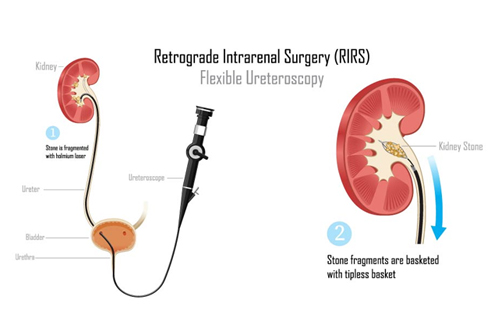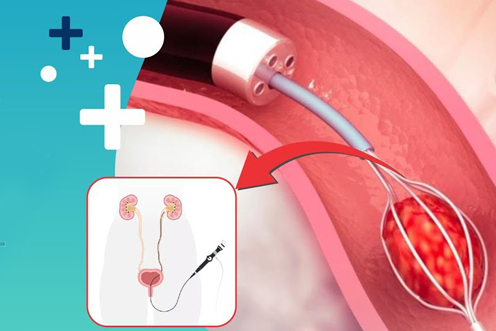Retrograde Intrarenal Surgery (RIRS) for Kidney Stones Treatment
RIRS, or Retrograde Intrarenal Surgery, is a minimally invasive procedure used to treat kidney stones. Understanding RIRS can help patients make informed decisions about their treatment options.

What is RIRS (Retrograde Intrarenal Surgery)?
RIRS is a procedure used to remove kidney stones from the urinary tract. It is performed using a small, flexible scope called a ureteroscope, which is passed through the urethra and into the bladder, then up into the kidney.
Indications for RIRS
RIRS may be recommended for patients with:
- Large kidney stones that cannot be passed naturally.
- Stones that are causing pain or infection.
- Stones that are blocking the flow of urine.
How RIRS is Performed
During RIRS, the ureteroscope is used to locate the kidney stone. Once the stone is located, it can be broken into smaller pieces using a laser or other tools attached to the scope. The smaller pieces are then removed from the body through the urinary tract.
Preparation for RIRS
Before undergoing RIRS, patients may need to undergo various tests and procedures to assess their overall health and the size and location of the kidney stone. They may also be advised to stop taking certain medications and to fast for a period before the procedure.
Benefits of RIRS
Some of the benefits of RIRS include:
- Minimally invasive: RIRS does not require any incisions, resulting in less pain and a faster recovery time.
- High success rate: RIRS is highly effective at removing kidney stones.
- Reduced risk of complications: Compared to traditional surgery, RIRS carries a lower risk of complications.
Risks and Complications of RIRS
Like any surgical procedure, RIRS carries some risks, including:
- Bleeding: In rare cases, RIRS can cause bleeding in the urinary tract.
- Infection: There is a small risk of developing a urinary tract infection after RIRS.
- Injury to surrounding tissues: The scope used in RIRS can potentially damage the lining of the urinary tract.
Recovery After RIRS
Recovery after RIRS is usually quick, with most patients able to resume normal activities within a few days. Patients may experience some discomfort or blood in their urine during the recovery period.
Diet and Lifestyle Recommendations Post-RIRS
After RIRS, patients are typically advised to drink plenty of fluids to help flush out any remaining stone fragments. They may also be given dietary recommendations to help prevent the formation of new kidney stones.
Comparing RIRS with Other Kidney Stone Treatments
RIRS is considered one of the most effective treatments for kidney stones, particularly for larger stones or stones located in difficult-to-reach areas of the kidney. Compared to other treatments, such as shock wave lithotripsy or traditional surgery, RIRS offers a higher success rate and lower risk of complications.
Hyderabad MultiSpeciality Hospital's Expertise in RIRS
- At Hyderabad MultiSpeciality Hospital, we have a team of highly skilled urologists and surgeons who specialize in performing RIRS.
- Our state-of-the-art facilities and advanced technologies ensure that patients receive the best possible care during their treatment.

Innovative Technologies Used in RIRS
Our hospital is equipped with the latest technologies for performing RIRS, including advanced imaging systems and laser technology. These technologies allow us to perform RIRS with precision and accuracy, resulting in better outcomes for our patients.
Patient Experiences and Success Stories
Patient experiences and success stories highlight the positive outcomes of RIRS and the impact it has had on their lives. These stories provide valuable insight into the effectiveness of RIRS and can help other patients feel more confident about their treatment choice.
Frequently Asked Questions About RIRS
1. How long does RIRS take?
The length of time it takes to perform RIRS can vary depending on the size and location of the kidney stone. In general, the procedure takes about 30 to 60 minutes.
2. Is RIRS painful?
RIRS is performed under general anesthesia, so patients do not feel any pain during the procedure. Some discomfort or pain may be experienced after the procedure, but this can usually be managed with pain medication.
Cost and Insurance Coverage for RIRS
The cost of RIRS can vary depending on a variety of factors, including the hospital where the procedure is performed and the patient's insurance coverage. Patients are advised to check with their insurance provider to determine if RIRS is covered under their plan.
Contact Us for More Information About RIRS
If you have any questions about RIRS or would like to schedule a consultation, please contact us at Hyderabad MultiSpeciality Hospital. Our team of experts is here to help you understand your treatment options and provide you with the care you need.